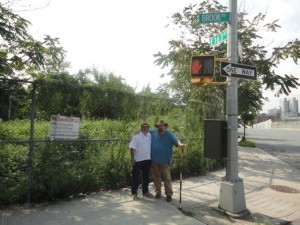
While many New Yorkers worried about flooding, blackouts and a transit shutdown as Hurricane Irene barreled up the east coast in August, Angel Rodriguez’ main concern was that he not lose the wedding gig he was scheduled to perform that Saturday evening.
The 58-year-old master percussionist was counting on the $150 he expected to earn from the show.
“I’m a struggling musician. I’m getting older and there’s not enough income,” said Rodriguez the day the storm was expected to hit the city. “I hope they don’t cancel.”
Like many musicians of his generation who perform Latin jazz and salsa, Rodriguez is finding it harder and harder to survive on a shrinking income from gigs and an ever-declining number of venues to perform in.
But one Bronx Developer is looking to help aging musicians keep Latin music alive by building a complex with apartments they can afford to rent.
City officials last year approved non-profit developer The Women’s Housing and Economic Development Corporation’s plan to build The Bronx Music Heritage Center on Elton Avenue between 162nd and 163rd St. in Melrose Commons. The developer projects the building will have 293 low-income apartments once it is completed, 100 of which will be subsidized. There will also be workspaces reserved for musicians.
The space will also house a performing arts venue, an area where exhibits highlighting the borough’s musical history will be displayed, and a music-themed high school. Construction on the 356,00 square-foot complex is scheduled to begin in 2013 and last two years.
During his heyday in the 60’s and 70’s when the Bronx was overflowing with salsa and jazz clubs, Rodriguez had no problem booking multiple well-paying gigs every week. Now he says he may get two during a good week, for the same sums he earned back then.
He and his fellow Latin music performers often get paid in cash for shows, and receive no benefits. At an age when many are planning to retire with pensions, they are left to fend for themselves.
Latin jazz flourished in the Bronx during the 1940’s and 50’s as waves of Puerto Ricans moved into the borough and established clubs in areas where Yiddish theaters reigned. A vibrant street music scene also thrived.
“Poor people couldn’t afford to go to clubs so they went to rumbas…jams in the parks,” recalled Rodriguez. “This was my school, I really didn’t know what I was playing at the time but I was learning the rhythms.”
But when living conditions started to deteriorate during the 70’s and 80’s, the musicians moved away. The music scene, which at one point included over 20 clubs and theaters around the site of the proposed Center, went with them.
The Bronx Heritage Center looks to keep the memory alive by celebrating the borough’s rich musical history, and restoring pride in the music and those who created it, many of whom are still performing.
The developers are hoping that by pairing the High School and Community Center with residences for the musicians, new relationships between young and old will develop, to the benefit of both.
Rodriguez will help bring back and curate the Living Legend series he ran at The Point CDC in Hunts Point to draw support for the project. He won praise from Borough President Ruben Diaz Jr. for that series, which brought together big name musicians, local artists, and students, but says a nod of approval is not enough to live on.
“We have the accolades, awards, applause, and appreciation, but not pension and benefits,” he said.
Mike Amadeo, who owns the Latin music store Casa Amadeo in Longwood, and has been writing songs for around fifty years, has seen his fair share of musicians pass through his shop over the decades. Amadeo approves of the initiative, but spoke grimly about the fate of the Latin music scene, and that of his contemporaries.
“A hundred apartments? How about 500! I’m ok because I have my store, there are guys still out there,” said Amadeo. “Even if they wanted to work, they couldn’t. All the clubs are closed.”
For musicians like Rodriguez around whose legacy the complex is planned, the day may soon come when they can return to the borough that gave them their rhythm and their beat.
“I want to come back to the Bronx, it gave me life,” said Rodriguez, who now lives in Brooklyn. “I want to die here, to rest here, this is it.”
